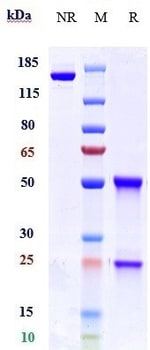Learn More
Invitrogen™ CD197 (CCR7) Monoclonal Antibody (4B12), PE, eBioscience™, Invitrogen™
Rat Monoclonal Antibody
Marke: Invitrogen™ 12-1971-80
Beschreibung
Description: The 4B12 monoclonal antibody reacts with mouse CCR7, also known as EBI-1 and CD197. CCR7 is a chemokine receptor for the chemokines CCL19 (CK?11, ELC, MIP3?, Scya19, Exodus-3) and CCL21 (CK?9, SLC, MIP2?, Scya21, Exodus-2). In recent years, the role of chemokines in directing the migration of lymphocytes has been well-characterized. One of the most important mediators of homeostatic trafficking of naive T cells to secondary lymphoid organs (SLO) is the chemokine receptor CCR7. Binding of its ligands, CCL19 and CCL21, mediates the trans endothelial migration of T cells across high endothelial venules into SLO. It has also been demonstrated that CCR7 plays a role in the localization of dendritic cells and B cells during an immune response. CCR7 is a chemokine receptor for the chemokines CCL19 (CK?11, ELC, MIP3?, Scya19, Exodus-3) and CCL21 (CK?9, SLC, MIP2?, Scya21, Exodus-2). In addition to its significant role in the chemotaxis of lymphocytes, human CCR7 has also been recognized as a marker for a distinct subset of memory T cells, the central memory (TCM) population. These cells are characterized by the expression of CCR7 and CD62L and reside within peripheral lymphoid organs. CCR7 also plays a role in thymocyte development and its deficiency leads to disturbed thymic architecture, aberrant T cell development, and limited thymocyte expansion.
CCR7 is a member of the G protein coupled receptor family, which is a subfamily of chemokines. CCR7 was identified to be induced by the Epstein Barr virus (EBV), and is thought to be a mediator of EBV effects on B lymphocytes. CCR7 has been reported to be expressed in blood, bone marrow, lymph node, and intestine. CCR7 is particularly expressed in lymphoid tissues and in activated B and T lymphocytes and has been shown to control the migration of memory T cells to inflamed tissues, as well as stimulate dendritic cell maturation. The chemokine (C-C motif) ligand 19 (CCL19/ECL) has been reported to be a specific ligand of this receptor. ESTs have been isolated from blood, embryo, lymph node, and thymus libraries. Receptors for the C - C chemokine family include CCR 1, CCR 2A, CCR 3, CCR 4, CCR 5 and the Duffy blood group antigen. The C-C receptors are important in the function of T cell chemotaxis and migration of phagocytic cells to sites of inflammation.
Spezifikation
| CD197 (CCR7) | |
| Monoclonal | |
| 0.2 mg/mL | |
| PBS with 0.09% sodium azide; pH 7.2 | |
| P47774 | |
| Ccr7 | |
| Affinity chromatography | |
| RUO | |
| 12775 | |
| 4°C, store in dark, DO NOT FREEZE! | |
| Liquid |
| Flow Cytometry | |
| 4B12 | |
| PE | |
| Ccr7 | |
| BLR2; Bukitt's lymphoma receptor 2; CC chemokine receptor 7; C-C chemokine receptor type 7; C-C CKR-7; C-C motif chemokine receptor 7; CC-CKR-7; CCR7; CCR-7; CD197; CDw197; chemokine (C-C motif) receptor 7; chemokine (C-C) receptor 7; Cmkbr7; EBI1; Ebi1h; EBV-induced G protein-coupled receptor 1; EBV-induced G-protein coupled receptor 1; Epstein-Barr virus induced gene 1; Epstein-Barr virus-induced G-protein coupled receptor 1; EVI1; lymphocyte-specific G protein-coupled peptide receptor; MIP-3 beta receptor | |
| Rat | |
| 25 μg | |
| Primary | |
| Mouse | |
| Antibody | |
| IgG2a κ |
Produktvorschläge
Customers who viewed this item also viewed.
Bitte geben Sie uns Ihr Feedback zu den Produktinhalten, indem Sie das folgende Formular ausfüllen.
For Research Use Only.

















